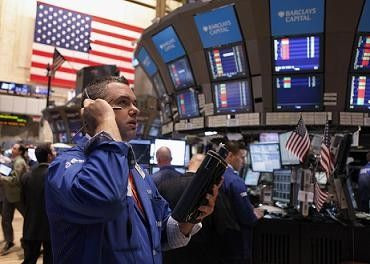World Stocks Break from 14-Month Lows

World stocks came off 14-month lows on Friday on expectations policymakers would take further action to ease the Eurozone debt crisis, while commodities fell broadly on worries about a global economic slump.
Trading was highly volatile with stocks seesawing between gains and losses, as investors jumped at buy or sell buttons on any indications from policy-makers that suggested additional steps to support the economy.
Market talk that the European Central Bank is considering stimulus measures to cope with the region's sovereign debt crisis helped boost sentiment, though investors remained cautious as speculation of a Greek default gathered pace.
Brent crude oil slid to a six-week low near $103 a barrel and copper tumbled to its lowest price in more than a year on concern slowing global growth may weigh on demand.
Gold slid to a 6-1/2 week low and headed for its sharpest weekly drop since December 2008. The sharp losses in the precious metal and spike in volatility have sparked renewed debate about the role of gold as a safe-haven.
Again, it's all on the news out of Europe, said Peter Cardillo, chief market economist at Rockwell Global Capital in New York.
We are also at the end of the quarter next week and large institutions are selling whatever they can to take profits, which is one of the reasons why gold and silver are lower.
Markets were jittery as Greece denied reports that one option in the debt crisis would be an orderly default with a 50 percent haircut, while Deutsche Bank warned European banks' writedowns on Greek bonds could exceed 25 percent.
On Wall Street, stocks were slightly up. The Dow Jones industrial average was up 2.23 points, or 0.02 percent, at 10,736.06. The Standard & Poor's 500 Index was up 4.43 points, or 0.39 percent, at 1,133.99. The Nasdaq Composite Index was up 15.38 points, or 0.63 percent, at 2,471.05.
Global stocks as measured by the MSCI All-Country index slipped 0.1 percent, having fallen as low as 274.20, its lowest level since July 2010.
The index is now in bear market territory -- defined as a fall of 20 percent or more from its peak -- having tumbled 23 percent from their 2011 high in May.
Riskier assets had staged a tentative recovery earlier after finance ministers and central bankers from the Group of 20 said they would take all steps necessary to calm the global financial system and said central banks were ready to provide liquidity. But skepticism grew that the G20 pledges would be followed up with action.
It's the usual platitudes... but they don't have the political capital to do what they need to do, which is bail out the southern European countries and recapitalize all the banks. I think it's a complete nonsense, Andrew Lim, banks analyst at Espirito Santo said.
Spot gold fell to $1,672.54 a troy ounce, having earlier hit its lowest level since August 8. Spot silver also fell sharply, dipping to its lowest level in nearly seven months as commodities came under heavy pressure on growth fears.
The Reuters-Jefferies CRB index .CRB, a 19-commodity global benchmark for the asset class, slipped 0.7 percent, heading for its biggest weekly fall since May.
Copper hit $7,115.75, its lowest since August 2010, having dropped nearly 15 percent over the past couple of days,
Brent crude was down 43 cents at $105.05. U.S. crude declined 59 cents to $79.91.
The euro rose 0.4 percent to at $1.3521. Ten-year U.S. Treasury note fell 20/32, yielding 1.7856 percent.
(Additional reporting by Emelia Sithole-Matarise in London and Angela Moon in New York; Editing by Chizu Nomiyama )
© Copyright Thomson Reuters {{Year}}. All rights reserved.






















